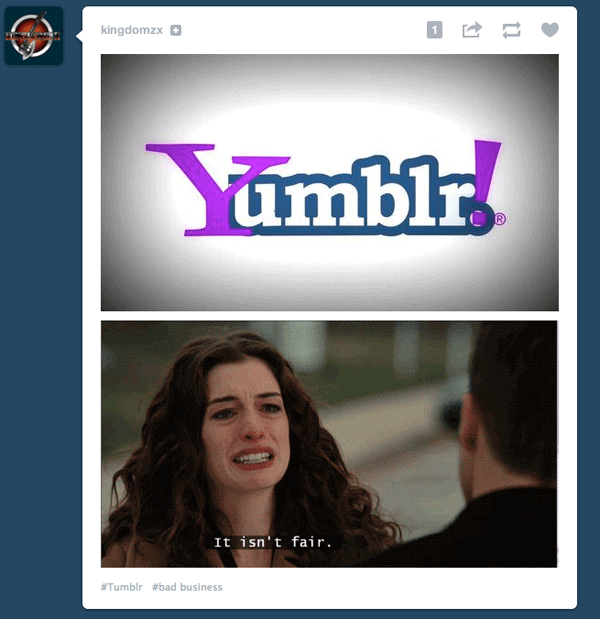Why the Yahoo deal is great for Tumblr
Tumblr will still get to have fun, while leaving all that tricky business about profit and advertising for Yahoo to sort out

A free daily email with the biggest news stories of the day – and the best features from TheWeek.com
You are now subscribed
Your newsletter sign-up was successful
It's a done deal: Yahoo has officially snatched up Tumblr, and its place at the Internet cool kids table, for $1.1 billion in cash.
Tumblr will continue to operate independently from Yahoo, David Karp will remain as Tumblr's CEO, and the social blogging platform's team and its product roadmap will stay the same. "We promise not to screw it up," wrote Yahoo chief Marissa Mayer at her (what else?) new Tumblr, complete with this custom, spaz-inducing GIF:

For Yahoo, the benefits are clear: 90 million Tumblr blogs, 89 million new posts a day, 900 posts every second, and, most critically, that coveted 18- to 24-year-old demographic of online tastemakers and their ancillary dose of cool.
The Week
Escape your echo chamber. Get the facts behind the news, plus analysis from multiple perspectives.

Sign up for The Week's Free Newsletters
From our morning news briefing to a weekly Good News Newsletter, get the best of The Week delivered directly to your inbox.
From our morning news briefing to a weekly Good News Newsletter, get the best of The Week delivered directly to your inbox.
For Tumblr? The benefits — other than access to Yahoo's deep pockets and resources — are less obvious. Although the two companies apparently share "a vision for Tumblr's business that doesn't compromise the community and product we love," Karp writes, Tumblr users are worried about Yahoo's iffy track record with big acquisitions, including GeoCities (which was shut down for good in 2009) and Flickr (a once-beloved photo service that is inexplicably still trying to rebuild).
So far, Tumblr users seem less than thrilled by the acquisition. A few samples quickly nabbed from the Tumblr dashboard:

In fact, when news of the Yahoo deal broke Sunday, WordPress founder Matt Mullenweg said that imports from Tumblr to his service went from a typical 400 to 600 a day to 72,000 overnight. Kara Swisher at All Things D notes that this isn't such "an uncommon occurrence," as some Posterous users fled when Twitter bought it, and Instagrammers threw a similar hissy fit when the photo service joined Facebook. (Also: 72,000 is relatively tiny considering Tumblr's 90 million blog army.)
And remember, Tumblr has struggled in the past to prove it can become a real business. Although the company has experimented with potential revenue-drivers like premium Tumblr themes and a Spotlight that helps bloggers attract new followers, Tumblr has been reluctant to place advertising in its dashboard, which many users considered a safe space before summer 2012, when Tumblr caved and subsequently annoyed everyone.
A free daily email with the biggest news stories of the day – and the best features from TheWeek.com
With Yahoo on board, Tumblr may be able to enjoy the best of both worlds. As John Battelle notes at Searchblog, the team-up "boils down to the trends driving Yahoo’s massive display business." Banner ads are on the way out; native advertising is in, as Google (AdWords), Twitter (Promoted Tweets), and Facebook (Sponsored Stories) have all proven.
Left out of this evolution, until now, has been Yahoo. When you break it down, Yahoo is a Very Large Display Advertising business, with a hefty side of search and a bit of this and that on top. And that display advertising business is going through a wrenching shift, as buyers move to more efficient programmatic channels […]
At the same time, we're all shifting our attention to mobile devices, and we've adopted the "stream" as our preferred method of content discovery and consumption. That stream doesn't work so well with standard display. But it's great for native units. [Searchblog]
Think of it this way: Tumblr gets to continue being Tumblr, which means all those trendy youngsters — after some heavy sighing — will continue to produce boatloads of blog posts until there's a better blogging alternative. (There isn't.) Yahoo, still the grown-up in the room, can tackle the thankless, messy task of figuring out how to make all that engagement attractive to advertisers.
The big question is whether Yahoo will truly be hands off with Tumblr's fun side. It's worth pointing out that large tech companies are doing quite well in allowing their big, headline-grabbing acquisitions to blossom independently. Instagram is maturing steadily under Facebook, and YouTube is still YouTube even with Google-injected ads.
That said, Tumblr won't make Yahoo cool. But maybe that's not the point. As Doug Aamoth at TIME points out, "Yahoo buying Tumblr merely makes Tumblr uncool — not the other way around." And yet, we're all doing something that really wasn't possible in the pre-Mayer era: Taking Yahoo seriously again.
-
 Health insurance: Premiums soar as ACA subsidies end
Health insurance: Premiums soar as ACA subsidies endFeature 1.4 million people have dropped coverage
-
 Anthropic: AI triggers the ‘SaaSpocalypse’
Anthropic: AI triggers the ‘SaaSpocalypse’Feature A grim reaper for software services?
-
 NIH director Bhattacharya tapped as acting CDC head
NIH director Bhattacharya tapped as acting CDC headSpeed Read Jay Bhattacharya, a critic of the CDC’s Covid-19 response, will now lead the Centers for Disease Control and Prevention